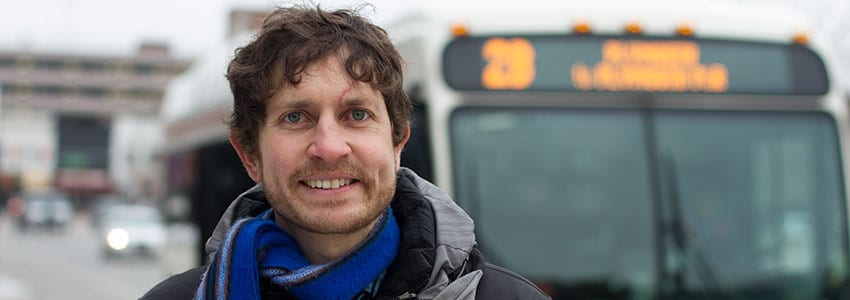“Public transit access is an important issue to me. I’ve been transit-dependent for years, so I have had the opportunity to see the limitations in our transportation system firsthand,” David says. He illustrates the impact of gaps in our transit system by mentioning a story in the news last year of Detroiter James Robinson. James received a lot of attention for walking to work, something very ordinary for many people, but because James had to take a bus and then walk hours to work, people were outraged at his experience.” David explains, “He had to walk because the two different counties he had to cross didn’t coordinate transit systems. There are a lot of gaps in the system across the board, and there is no public transportation at all from Ann Arbor to Detroit. There has been poor coordination due to separate funding sources for transit systems. My research looks at the funding side.”
“The goal of my research is creating a system that works, something that allows us to do regional transportation programs without federal money, or with less federal money. That’s the reality,” David states. As federal funding has stagnated over the years, local jurisdictions were left to fund transportation themselves, and do so in an uncoordinated fashion. He explains, “This leaves a lot of people unable to get to work as economies became more regionalized and jobs take them across the county line. This system is bad for the overall economy and for employers, leaving them with a less diverse workforce.”
David’s research examines cases that have managed to adapt to this system and have used localized funding in a more coordinated, multijurisdictional manner. He explores five different U.S. regions that have funded their multijurisdictional transportation system to determine how that process took place. He describes, “A big factor is how the state legislature participates. Our region is about to be added to the list of regions that have adapted by initiating multicounty voter initiatives to propose regional transit plans – we’re going to have a regional transit measure on the ballot in 2016 to fund a four county bus system.” He’s a volunteer at Regional Transit Authority on the citizen advisory committee, advising on the upcoming process and plans they’re developing. He’s enjoyed that process, saying, “I’ve been able to give the CEO a lot of information from my research.”
How the legislation was presented affects the ability for coordinated funding to succeed. Certain factors in the legislation affected the process, like mandating a specific election date that has a way of overriding the local politics, or mandating the geography of the system. He says, “If one local area isn’t invested in the idea, that could present problems. Other regions say, if jurisdictions want to join, they join. You get into technical factors like that and tax rates and types of taxes; all of these issues have political ramifications for the process.”
It’s an exciting time and place to be studying transit. “This has been a good experience; there are a lot of efforts to improve transit research. A lot happening here is from scratch and is happening regionally – I didn’t see this in Los Angeles for sure.”
A native of Orange County, California, David attended UC Berkeley for his undergrad and UC Irvine for his Master’s degree. Michigan was clearly a departure for him, but it was all about the fit. He shares, “U-M has a very good department with researchers looking at both transit and regional issues, and a much stronger regionally-oriented program that most universities. It is rare to find a program that has both. It’s been really intellectually stimulating. I’ve met a lot of great students and professors. I’ve been exposed to Detroit, which I think is totally different than anywhere else I’ve been in the U.S.
“Public transit is a topic people didn’t talk about much in the past in such an auto state, but now Michigan has a more diverse range of industries. Detroit is finding in this era when people have smart phones that transit isn’t as hard to use. Detroit finds we don’t have the system and needs to determine how we compete as a region. The regional transit bill came right from the governor’s office to address this issue. He saw the importance of improving the economy but needed to provide the bones for the economy to come back.”
A non-driver, David has been challenged by the isolation presented by the lack of regional transportation. “I’m mostly in Ann Arbor, and that partly made it difficult to be at Michigan. I haven’t seen most of the state, just Ann Arbor and Detroit, and not the nightlife in Detroit. Still, the Detroit Connector has been a godsend. That’s made my experience a lot better.”
Connected to his dissertation, he is writing a policy paper for University of Michigan Initiative in Disability Studies (UMInDS) on the role people in the disability community have had in making decisions on regional transportation funding policies and on decisions on transit in general.
For these projects, he has conducted extensive interviews with community members from the disability community, public officials, senators, and people who wrote the legislation or were part of the political process. “I’m hoping this research is an opportunity to allow public transportation to be better coordinated at the regional level. ‘He who has the gold makes the rules’ – if the funding can come at the regional level, hopefully the planning can come at the regional level as well.”
David is interested in looking at faculty positions in planning or public policy departments. “I like going to different places and being exposed to the unique problems they have. I don’t want to do research focused on just a single case.” David is finishing his writing, preparing the final cross case analysis comparing them all, and expects to defend his dissertation and graduate in the spring of 2016.

